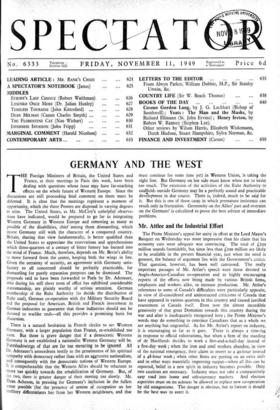GERMANY AND THE WEST
THE Foreign Ministers of Britain, the United States and France, at their meetings in Paris this week, have been dealing with questions whose issue may have far-reaching effects on the whole future of Western Europe. Since the discussions are still proceeding final comment on them must be deferred. It is clear that the meetings represent a moment of opportunity, which the three Powers are disposed in varying degrees to seize. The United States, as Mr. McCloy's unhelpful observa- tions have indicated, would be prepared to go far in integrating Western Germany in Western Europe and removing as many as possible of the disabilities, chief 'among them dismantling, which invest Germany still with the character of a conquered country. Britain, sharing that view fundamentally, is better qualified than the United States to appreciate the reservations and apprehensions which three-quarters of a century of bitter history has burned into the mind of France. Much, therefore, depends on Mr. Bevin's ability to move-forward from the centre, keeping both the wings in line. Given the certainty of security, an agreement with Germany satis- factory to all concerned should be perfectly practicable, for dismantling for purely reparation purposes can be dismissed. The proposals said to have been forwarded to Paris by Dr. Adenauer, who during his still short term of office has exhibited considerable statesmanship, are plainly worthy of serious attention. German membership of the Ruhr Authority (to decide the distribution of Ruhr coal), German co-operation with the Military Security Board and the proposal for American, British and French investment in German industries as guarantee that these industries should not be devoted to warlike ends—all this provides a promising basis for discussion.
There is a natural hesitation in French circles to see Western Germany, with a larger population than France, re-established too soon. But there is grave danger that if a democratic Western Germany is not established a nationalist Western Germany will be. Foreshadowings of that are far too menacing to be ignored. All Dr. Adenauer's antecedents testify to the genuineness of his spiritual sympathy with democracy rather than with an aggressive nationalism, and consequently with the democratic nations of Western Europe. It is comprehensible that the Western Allies should be reluctant to move too quickly towards the rehabilitation of Germany. But, of the two, there is greater danger of their moving too slowly. Mr. Dean Acheson, in pressing for Germany's inclusion in the fullest sense possible (for the preience of armies of occupation on her territory differentiates her from her Western neighbours, and that
must continue for some time yet) in Western Union, is taking the right line. But Germany on her side must know when not to insist too much. The extension of the activities of the Ruhr Authority to coalfields outside Germany may be a perfectly sound and practicable development in due course. There is, indeed, much to be said for it. But this is one of those cases in which premature insistence can result only in frustration. Generosity on the Allies' part and restraint on the Germans' is calculated to prove the best solvent of immediate problems.


































